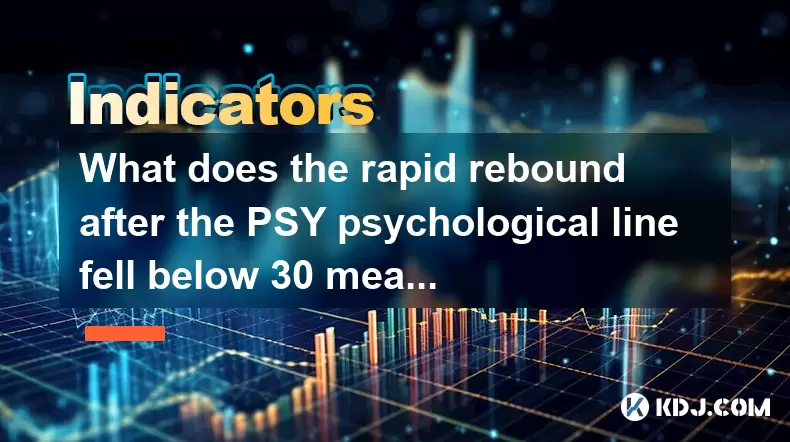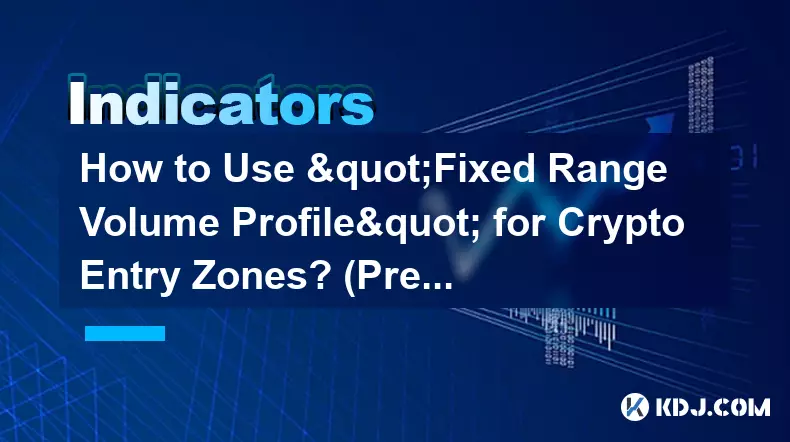-
 bitcoin
bitcoin $87959.907984 USD
1.34% -
 ethereum
ethereum $2920.497338 USD
3.04% -
 tether
tether $0.999775 USD
0.00% -
 xrp
xrp $2.237324 USD
8.12% -
 bnb
bnb $860.243768 USD
0.90% -
 solana
solana $138.089498 USD
5.43% -
 usd-coin
usd-coin $0.999807 USD
0.01% -
 tron
tron $0.272801 USD
-1.53% -
 dogecoin
dogecoin $0.150904 USD
2.96% -
 cardano
cardano $0.421635 USD
1.97% -
 hyperliquid
hyperliquid $32.152445 USD
2.23% -
 bitcoin-cash
bitcoin-cash $533.301069 USD
-1.94% -
 chainlink
chainlink $12.953417 USD
2.68% -
 unus-sed-leo
unus-sed-leo $9.535951 USD
0.73% -
 zcash
zcash $521.483386 USD
-2.87%
What does the rapid rebound after the PSY psychological line fell below 30 mean?
When the PSY psychological line drops below 30, it signals extreme bearishness in crypto markets, often preceding a rapid rebound as selling pressure exhausts and buyers step in.
Jun 20, 2025 at 10:21 am

Understanding the PSY Psychological Line Indicator
The PSY psychological line indicator is a technical analysis tool used primarily in financial markets, including cryptocurrency trading, to gauge investor sentiment. It measures the ratio of days when prices closed higher versus days when they closed lower over a specific period—typically 12 or 24 days. The resulting value ranges from 0 to 100. When the PSY line falls below 30, it signals that the market may be oversold and that bearish sentiment has reached an extreme.
In the context of cryptocurrency, where volatility is high and sentiment-driven moves are common, a reading below 30 often precedes a reversal. This means that traders who monitor this indicator closely may interpret such levels as a potential buying opportunity.
What Happens When the PSY Falls Below 30?
When the PSY psychological line drops below 30, it reflects strong pessimism among traders and investors. In crypto markets, which are heavily influenced by retail participation, such low readings can lead to panic selling and capitulation phases. During these times, many holders sell off their positions due to fear or uncertainty.
However, experienced traders know that such extreme readings can also indicate exhaustion in selling pressure. Once the number of sellers diminishes, buyers may step in to take advantage of what they perceive as undervalued assets. This dynamic often leads to a rapid rebound in price shortly after the indicator reaches such low levels.
The Significance of a Rapid Rebound After a PSY Reading Below 30
A rapid rebound following a PSY psychological line drop below 30 typically suggests that the market has found temporary support. In the case of cryptocurrencies like Bitcoin or Ethereum, this could mean a short-term bottom is forming. Traders might look for additional confirmation signals such as bullish candlestick patterns, volume spikes, or other momentum indicators aligning with the PSY signal.
This type of rebound doesn’t necessarily imply a long-term trend change but rather a correction in sentiment. It’s important for traders to evaluate the broader context, including macroeconomic conditions, exchange flows, and on-chain metrics, before making decisions based solely on the PSY indicator.
How to Interpret This Signal in Cryptocurrency Trading
To effectively interpret the rapid rebound after the PSY psychological line fell below 30, traders should follow these steps:
- Identify the time frame: Determine whether the PSY indicator was calculated using daily, weekly, or shorter intervals.
- Cross-check with volume: A sharp increase in trading volume during the rebound phase adds credibility to the reversal signal.
- Monitor support/resistance levels: See if the rebound coincides with key price zones that historically acted as support or resistance.
- Use complementary indicators: Combine the PSY signal with RSI (Relative Strength Index), MACD (Moving Average Convergence Divergence), or moving averages to filter false signals.
- Set clear entry/exit points: Define stop-loss and take-profit levels based on recent volatility and historical price behavior.
These steps help traders avoid emotional decision-making and provide a structured approach to evaluating the strength of the rebound.
Historical Examples in Crypto Markets
Looking at past data, there have been several instances where the PSY psychological line dropped below 30, followed by a sharp recovery in major cryptocurrencies:
- Bitcoin in early 2023: Following a prolonged downtrend, Bitcoin's PSY indicator briefly dipped below 30, signaling extreme bearishness. Within a week, the price surged more than 20%, driven by positive macro news and increased institutional interest.
- Ethereum in late 2022: Amidst a broader market selloff, Ethereum’s PSY line hit 28. Shortly afterward, a rally began fueled by anticipation around the network’s upcoming upgrades.
- Altcoins in mid-2021: Many altcoins saw their PSY lines fall below 30 during a market-wide correction. Those that rebounded quickly were often linked to strong fundamentals or sector-specific developments.
These examples highlight how the PSY psychological line falling below 30 can act as a precursor to meaningful price movements, especially when supported by other market dynamics.
Frequently Asked Questions
Q: Can the PSY psychological line be applied to all cryptocurrencies?Yes, the PSY psychological line can be applied to any cryptocurrency that has sufficient historical price data. However, its effectiveness may vary depending on the asset’s liquidity, trading volume, and overall market maturity.
Q: Is the rapid rebound always guaranteed after the PSY falls below 30?No, while a rapid rebound is commonly observed after the PSY psychological line drops below 30, it is not guaranteed. Other factors such as regulatory changes, macroeconomic events, or sudden shifts in market sentiment can override this signal.
Q: How does the PSY indicator compare to RSI in crypto trading?Both the PSY psychological line and RSI measure market sentiment, but they do so differently. RSI focuses on price momentum and overbought/oversold levels, whereas PSY focuses purely on the number of up and down days. Some traders prefer using both together to enhance accuracy.
Q: What settings should I use for the PSY indicator in crypto charts?Most platforms default to a 12-day or 24-day setting for the PSY psychological line. For highly volatile cryptocurrencies, shorter periods may generate more responsive signals, while longer periods smooth out noise and offer clearer trends.
Disclaimer:info@kdj.com
The information provided is not trading advice. kdj.com does not assume any responsibility for any investments made based on the information provided in this article. Cryptocurrencies are highly volatile and it is highly recommended that you invest with caution after thorough research!
If you believe that the content used on this website infringes your copyright, please contact us immediately (info@kdj.com) and we will delete it promptly.
- Bitcoin Faces Identity Crisis as Speculators Flock to Prediction Markets and Ultra-Short Options
- 2026-02-02 00:30:06
- MGK and Jelly Roll Honor Ozzy Osbourne at Pre-Grammy Gala, Sparking Fan Frenzy
- 2026-02-02 00:50:02
- Super Bowl Coin Flip: Unpacking the Prediction Power of Heads or Tails
- 2026-02-02 01:30:01
- Litecoin Price Cracks 9-Year Floor Amidst Market Breakdown: What's Next for the OG Crypto?
- 2026-02-02 01:20:02
- Crypto News, Cryptocurrency Markets, Latest Updates: A Topsy-Turvy Start to 2026
- 2026-02-02 01:15:01
- New York Minute: LivLive Presale Ignites, While Solana Navigates Choppy Waters
- 2026-02-02 01:15:01
Related knowledge

How to Use "Dynamic Support and Resistance" for Crypto Swing Trading? (EMA)
Feb 01,2026 at 12:20am
Understanding Dynamic Support and Resistance in Crypto Markets1. Dynamic support and resistance levels shift over time based on price action and movin...

How to Use "Fixed Range Volume Profile" for Crypto Entry Zones? (Precision)
Feb 01,2026 at 10:19pm
Understanding Fixed Range Volume Profile Mechanics1. Fixed Range Volume Profile (FRVP) maps traded volume at specific price levels within a defined ti...

How to Identify "Symmetry Triangle" Breakouts in Altcoin Trading? (Patterns)
Feb 01,2026 at 01:39pm
Symmetry Triangle Formation Mechanics1. A symmetry triangle emerges when price action consolidates between two converging trendlines—one descending an...

How to Use "Negative Volume Index" (NVI) to Track Crypto Smart Money? (Pro)
Feb 01,2026 at 02:40am
Understanding NVI Mechanics in Crypto Markets1. NVI calculates cumulative price change only on days when trading volume decreases compared to the prio...

How to Spot "Absorption" in Crypto Order Books? (Scalping Technique)
Feb 01,2026 at 08:39pm
Understanding Absorption Mechanics1. Absorption occurs when large buy or sell orders repeatedly appear and vanish at the same price level without trig...

How to Use "Percent Price Oscillator" (PPO) for Crypto Comparison? (Strategy)
Feb 01,2026 at 01:59am
Understanding PPO Mechanics in Volatile Crypto Markets1. The Percent Price Oscillator calculates the difference between two exponential moving average...

How to Use "Dynamic Support and Resistance" for Crypto Swing Trading? (EMA)
Feb 01,2026 at 12:20am
Understanding Dynamic Support and Resistance in Crypto Markets1. Dynamic support and resistance levels shift over time based on price action and movin...

How to Use "Fixed Range Volume Profile" for Crypto Entry Zones? (Precision)
Feb 01,2026 at 10:19pm
Understanding Fixed Range Volume Profile Mechanics1. Fixed Range Volume Profile (FRVP) maps traded volume at specific price levels within a defined ti...

How to Identify "Symmetry Triangle" Breakouts in Altcoin Trading? (Patterns)
Feb 01,2026 at 01:39pm
Symmetry Triangle Formation Mechanics1. A symmetry triangle emerges when price action consolidates between two converging trendlines—one descending an...

How to Use "Negative Volume Index" (NVI) to Track Crypto Smart Money? (Pro)
Feb 01,2026 at 02:40am
Understanding NVI Mechanics in Crypto Markets1. NVI calculates cumulative price change only on days when trading volume decreases compared to the prio...

How to Spot "Absorption" in Crypto Order Books? (Scalping Technique)
Feb 01,2026 at 08:39pm
Understanding Absorption Mechanics1. Absorption occurs when large buy or sell orders repeatedly appear and vanish at the same price level without trig...

How to Use "Percent Price Oscillator" (PPO) for Crypto Comparison? (Strategy)
Feb 01,2026 at 01:59am
Understanding PPO Mechanics in Volatile Crypto Markets1. The Percent Price Oscillator calculates the difference between two exponential moving average...
See all articles










































































